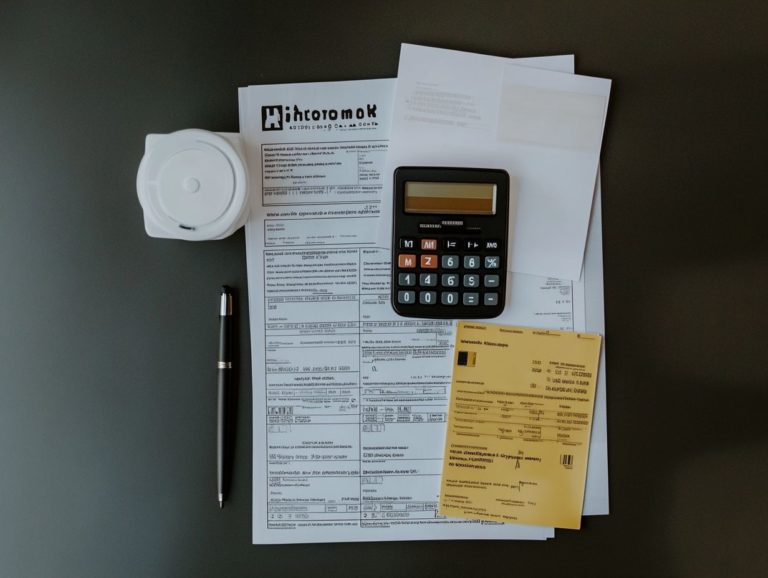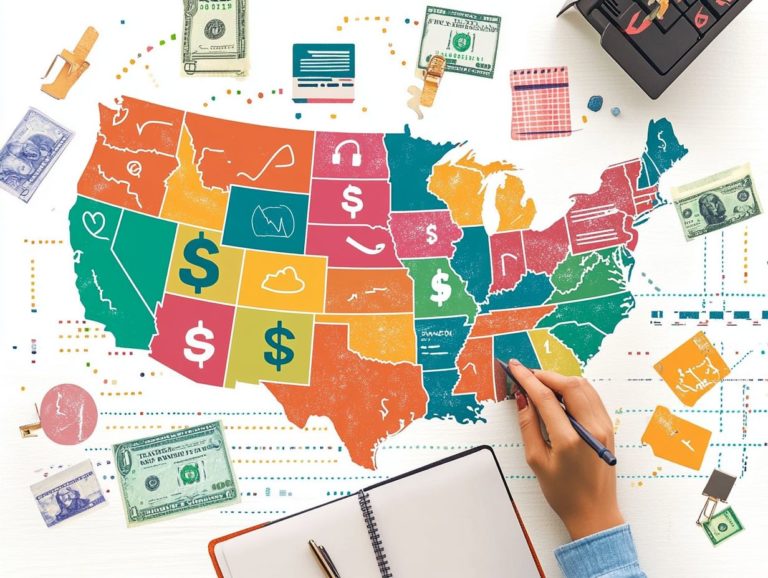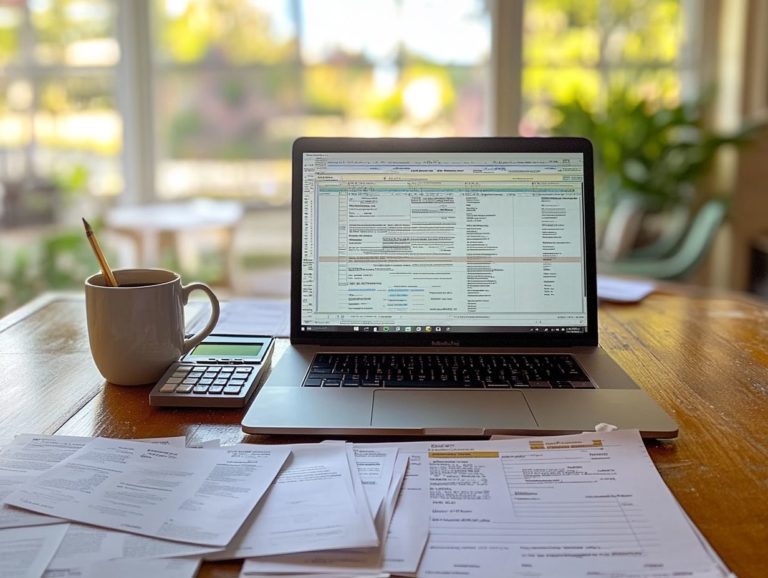Freelancer Tax Tips for Artists and Creatives
Freelancing offers a rewarding journey, yet the tax landscape can often feel like a daunting maze, particularly for freelance artists and creative thinkers like you. Grasping which taxes you need to pay, keeping track of important deadlines, and maximizing tax deductions tailored to your unique work are all vital components of your financial success.
This article delivers essential insights for managing your taxes, maintaining organized finances, and understanding self-employment tax rates everything designed to empower you to flourish in your creative industry pursuits.
Contents
- Key Takeaways:
- Understanding Taxes for Freelancers
- Maximizing Deductions for Artists and Creatives
- Keeping Track of Finances and Records
- Navigating Self-Employment Taxes
- Frequently Asked Questions
- What is the difference between a freelancer and an employee?
- Do I need to pay taxes as a freelancer?
- What types of expenses can I deduct as a freelancer?
- Can I use my home office as a tax deduction?
- Should I track my income and expenses throughout the year?
- Do I need to file taxes in every state I work in as a freelancer?
Key Takeaways:

- You need to understand the taxes you are responsible for paying as a freelancer, such as self-employment taxes and federal income tax.
- Take advantage of common and specific deductions for artists and creatives, like home office expenses and equipment costs.
- Keep accurate and organized financial records using tools and strategies, and be aware of important deadlines for filing income tax returns and making payments.
Understanding Taxes for Freelancers
Understanding taxes is essential for freelancers, especially those in the creative industry. Freelance artists often find themselves navigating tax rules. It’s imperative for freelancers to grasp the nuances of tax planning, including necessary forms like Schedule C which is used to report income or loss from your business and Schedule SE, which helps calculate self-employment tax. These forms are vital for reporting freelance income and ensuring compliance with the IRS and the US Tax Cuts and Jobs Act.
By leveraging your accounting knowledge and understanding your tax liabilities, you can minimize your income taxes and maximize your tax savings through strategic financial planning, including healthcare planning. Mastering the complexities of artist taxes can pave the way for business growth and bolster the legitimacy of small business owners. For new freelancers, exploring tax planning tips can be particularly beneficial.
What Taxes Do Freelancers Need to Pay?
Freelancers must be acutely aware of the various taxes they have to pay, including federal income tax, employment taxes, and self-employment tax. These can vary significantly based on your taxable income and the corresponding tax brackets, including the 2018 tax brackets. Understanding these tax responsibilities is essential for effectively managing your personal income and ensuring compliance with the IRS, especially regarding your tax return.
Being aware of your tax responsibilities helps prevent surprises during tax season and aids in planning for future expenses, enhancing your overall financial planning. The self-employment tax, which includes Social Security and Medicare, is particularly important for freelancers, as it typically amounts to approximately 15.3% of your net earnings. Utilizing freelancer tax strategies for increased savings can further optimize your financial situation.
You must track your income closely to avoid pitfalls, as taxable income can fluctuate throughout the year depending on your project workload and business income. Familiarity with tax brackets enables you to estimate your potential tax liability more accurately, which is essential for your overall tax planning. Additionally, consider these 5 essential tax tips for creative freelancers to enhance your financial strategy.
For example, resources like IRS publications, including IRS Publication 535, and tax software can provide invaluable guidance and tools to help you calculate these obligations, making it easier to manage your finances effectively.
Important Deadlines to Keep in Mind
Navigating crucial deadlines associated with tax season is essential for freelancers and self-employed individuals, especially concerning income reporting. Missing these deadlines can lead to penalties or worse, missed deductions on your income tax return. Key dates like the filing deadline for federal income tax returns, estimated tax payments to the IRS, and specific deadlines for 1099-MISC and 1099-NEC are extremely important.
These deadlines can quietly creep up on busy professionals like you. You often juggle multiple projects and clients while also considering your marketing expenses. You should be particularly vigilant about filing your federal tax returns by April 15 each year. Additionally, understanding what to know about sales tax as a freelancer is crucial. Quarterly estimated tax payments are due in mid-April, June, September, and January of the following year, according to the Small Business Administration.
It’s not just about hitting those due dates; keeping meticulous records throughout the year is crucial for tracking all eligible business expenses. This proactive approach helps you avoid penalties and maximizes your potential deductions, leading to greater financial peace of mind and tax advantages.
Maximizing Deductions for Artists and Creatives
Maximizing deductions is vital for you as an artist or creative. It allows you to lower your taxable income and minimize your overall tax liability!
Understanding which business expenses qualify as tax deductions like advertising costs, marketing expenses, and contributions to retirement accounts can significantly enhance your financial planning and lead to substantial tax savings.
This knowledge enables you to make informed decisions, ensuring your creative endeavors are as financially rewarding as they are fulfilling. It highlights the importance of financial knowledge.
Common Deductions for Freelancers

Freelancers can take advantage of several common tax deductions that significantly lower their taxable income and overall tax burden. These deductions often include business expenses like home office costs, equipment purchases, and the standard deduction for individual taxpayers, which is essential for maintaining business legitimacy.
Understanding these deductions is vital for freelancers looking to refine their financial strategies and improve their tax documentation. For instance, you can deduct expenses related to your work environment, such as a portion of your utility bills or rent if you have a dedicated workspace at home. The costs of purchasing essential tools and software, including accounting software, are also deductible. To avoid common pitfalls, check out the top tax mistakes freelancers make. This encourages you to invest in the best resources for your creative work.
By mastering the art of accurate record-keeping and familiarizing yourself with the eligibility criteria outlined in IRS Publication 535 (which explains which business expenses you can deduct), you can maximize your deductions and ensure proper income reporting. Additionally, understanding how to handle tax audits as a freelancer will further help you save money while staying compliant with tax regulations.
Specific Deductions for Artists and Creatives
As an artist or creative freelancer, you have access to specific tax deductions tailored to your unique business needs. This includes expenses related to equipment purchases, production costs, and studio rentals. Understanding these deductions is crucial for optimizing your tax savings!
For example, you can often write off materials like paints, canvases, or digital tools. You can also deduct tuition fees for workshops that enhance your skills and knowledge in your craft. Additionally, many artists can benefit from 5 tax credits freelancers shouldn’t miss, as travel expenses for exhibitions or performances can be eligible for deduction, significantly easing the financial burden of pursuing their passion.
Keep your records organized, and watch your savings grow! Clear documentation not only streamlines the claiming process but also ensures you maximize your potential deductions while staying compliant with tax regulations.
Don’t hesitate to consult a tax professional or assess your financial records today!
Keeping Track of Finances and Records
Managing your finances and maintaining precise records is crucial for freelancers, especially in the creative realm. It significantly influences your tax responsibilities and financial planning.
By adopting effective tools and strategies for record-keeping, you can simplify the income reporting process. Ensure that every business expense is accurately documented. This proactive approach not only saves you time but also helps you navigate your financial landscape with confidence.
Tools and Strategies for Managing Finances
Using accounting software and digital tools can elevate your financial management as a freelancer. These tools simplify tracking income and managing tax documentation, while also improving your overall financial knowledge.
Platforms like TurboTax, TaxAct, and other accounting firms can transform the often daunting task of calculating income taxes and generating reports into a seamless experience.
These tools not only streamline your calculations but also include essential features like expense tracking, invoicing, and financial forecasting crucial for creative freelancers managing multiple projects. For creative freelancers, services such as FreshBooks and QuickBooks Self-Employed offer user-friendly interfaces and specialized functions. They enable you to categorize expenses effortlessly and maintain meticulous records of your income streams, which highlights the importance of keeping tax records for freelancers.
This approach brings excitement and organization to your financial life, ensuring that no deduction slips through the cracks when tax season rolls around. The ability to sync with your bank accounts enhances accuracy and alleviates the stress tied to manual tracking.
By harnessing these versatile tools, you can focus more on your craft while enjoying the peace of mind that comes with financial clarity.
Record-Keeping Best Practices
Adopting best practices for record-keeping is essential for freelancers. This ensures your tax documentation is not just accurate but also complete, leading to effective income reporting. This diligence aids in income reporting and minimizes any potential discrepancies with the IRS, particularly concerning your business identification.
You should focus on the following:
- Organizing your receipts
- Establishing a clear system for business identification
- Carving out time for regular financial reviews
Implementing a reliable method for categorizing your expenses like using specific folders for different expenditures such as travel, supplies, and utilities can significantly streamline your process during tax season. Regular reviews will help you spot errors early and give you a clearer understanding of your financial health, allowing you to make informed decisions about budgeting and investments.
Leveraging digital tools or accounting software can enhance your efficiency, reducing the chances of missed entries and ensuring that all your financial activities are documented accurately and in real-time.

Dealing with self-employment taxes can be tricky for freelancers. You bear the dual responsibility of both income tax and self-employment tax, which includes Social Security and Medicare taxes.
Understanding the applicable tax rates and their impact on your overall income tax return is essential for effective financial planning. It also ensures compliance with IRS regulations. This understanding helps you manage your obligations and positions you for greater financial success.
Don’t wait until tax season arrives start organizing your records today!
Understanding Self-Employment Tax Rates
Self-employment tax rates depend on your taxable income. It s vital for freelancers to understand these rates to know what they owe in taxes. The IRS outlines the current self-employment tax rates, which generally include both Social Security and Medicare components.
For the 2023 tax year, the tax rate is 15.3%, comprised of 12.4% for Social Security and 2.9% for Medicare. Notably, only the first $160,200 of your income is subject to the Social Security tax, while Medicare applies to all earnings without any cap.
If you’re earning $50,000, you d owe about $7,650 in self-employment taxes. Conversely, if your income rises to $200,000, that amount increases to roughly $28,600. This big difference shows why you need to consider these rates when planning your finances, especially for freelance artists and creative thinkers. To maximize your financial efficiency, be sure to explore maximizing deductions specific to freelancers.
Tips for Filing Self-Employment Taxes
Filing self-employment taxes requires careful preparation and organization. You must accurately report your income and expenses on your tax return to effectively minimize your tax liability. Understanding the filing process is crucial for reducing your workload during tax season.
To get started, familiarize yourself with essential forms:
- Schedule C (for reporting income and expenses)
- Schedule SE (to calculate self-employment tax)
Watch important deadlines, typically April 15 for annual returns, and quarterly estimated tax payments due on the 15th of April, June, September, and January.
Maintaining meticulous records throughout the year like receipts, invoices, and bank statements will simplify your filing process and ensure you don t overlook any deductible expenses, such as marketing expenses and advertising costs.
Utilizing accounting software or resources like the IRS website can make the entire process smoother and more efficient.
Frequently Asked Questions
What is the difference between a freelancer and an employee?
A freelancer is a self-employed individual who works independently and provides services to multiple clients. In contrast, an employee is hired by a company to work for them on a regular basis.
Do I need to pay taxes as a freelancer?

Yes, as a freelancer, you are responsible for paying taxes on your income. You may need to pay estimated taxes quarterly, depending on your income and tax situation.
What types of expenses can I deduct as a freelancer?
As an artist or creative freelancer, you can deduct expenses related to your business, such as:
- Art supplies
- Studio rental
- Business travel
- Marketing costs
Make sure to keep accurate records of these expenses.
Can I use my home office as a tax deduction?
If you use a dedicated space in your home for your freelance work, you may be able to claim a home office deduction. However, there are specific requirements and limitations for this deduction, so it’s best to consult with a tax professional.
Should I track my income and expenses throughout the year?
Yes, it’s essential to keep track of your income and expenses throughout the year. This practice helps you accurately report them on your tax return and identify any potential tax deductions or credits you may qualify for.
Do I need to file taxes in every state I work in as a freelancer?
If you work in multiple states, you might need to file taxes in each one. However, this can vary based on the type of work you do and the state’s tax laws. It’s best to consult a tax professional for guidance tailored to your situation.






